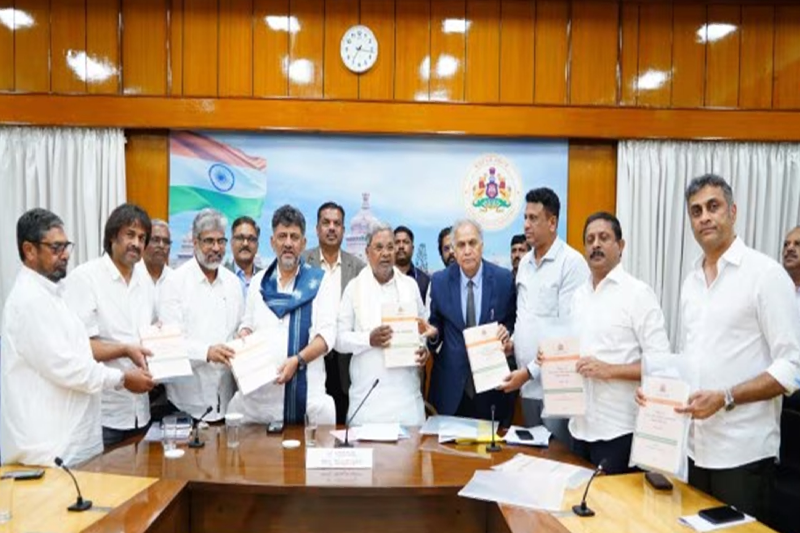
Karnataka Unveils State-Specific Education Policy: Local Curriculum, Reservation in Private Institutions, and Financial Aid Boosts
The Karnataka State Education Policy Commission, chaired by economist and former UGC Chairman Prof. Sukhadeo Thorat, has submitted a landmark report to Chief Minister Siddaramaiah. This policy proposes sweeping school and higher education reforms explicitly tailored to the state’s socio-cultural, linguistic, and economic realities — operating independently of the National Education Policy (NEP) 2020.
These changes could redefine how education is delivered, accessed, and governed in Karnataka over the coming decade.
School Education: Moving Beyond NCERT and Localising Curriculum
One of the most notable departures from NEP 2020 is Karnataka’s decision to abandon NCERT textbooks. Instead, the state will develop its own Comprehensive Curriculum for School Education (CCSE), ensuring that the content is locally relevant.
The policy also addresses the unregulated pre-primary sector by introducing a dedicated regulatory framework for private schools. Additionally, a separate regulator will oversee private schools across the state, responding to concerns about high admission fees, arbitrary age restrictions, and other compliance issues.
A New 2+8+4 Structure
Replacing NEP’s 5+3+3+4 model, Karnataka proposes a 2+8+4 structure:
- 2 years of pre-primary
- 8 years of primary education
- 4 years of secondary education
The reform also mandates Kannada or the mother tongue as the medium of instruction up to Class 5 across all boards — CBSE, ICSE, and state — aligning with NEP’s recommendation to prioritise home or regional languages at least till Grade 5.
Two-Language Policy
Rejecting NEP’s three-language formula, the state will implement a two-language education policy:
- Kannada, or the mother tongue
- English
This approach reflects Chief Minister Siddaramaiah’s objection to imposing Hindi in state education.
Budget Prioritisation and Flexible Learning
To strengthen education delivery, the commission recommends:
- Increasing education spending to 30% of Karnataka’s total budget
- Annual per-student spending increases of 5–10%
- Establishing the Karnataka State Open School System for working students and dropouts
- Making Constitutional Values Education a compulsory subject
Higher Education: Extending Reservation and Ensuring Transparency
In a significant shift, the policy proposes extending Karnataka’s reservation policy to private unaided institutions, including:
- Universities
- Deemed universities
- Autonomous colleges
Citing Article 15(5) of the Constitution, it calls for implementing SC/ST/OBC reservations in admissions across these institutions. All admissions in private institutions will be brought under a transparent, merit-based, and regulated framework to prevent exclusion and maintain accountability.
Degree Structures and Language in Teaching
Karnataka will diverge from NEP’s uniform 4-year undergraduate model:
- General education: 3-year undergraduate + 2-year postgraduate
- Professional programs: 4-year undergraduate + 2-year postgraduate
Postgraduate admissions will be open across state universities, and higher education institutions will be encouraged to adopt bilingual teaching — Kannada (or another mother tongue) alongside English.
Special Initiatives for Equity
The policy includes several equity-focused measures:
- Free higher education for girls in government, aided, and unaided institutions
- Financial incentives to delay child marriage
- SC/ST/OBC reservation enforcement in private institutions
- Expanded post-matric scholarships and an increased income limit for eligibility to ₹10 lakh per annum
Research and Innovation Push
The commission proposes establishing a State Research Foundation with a ₹500 crore seed fund to promote research and innovation across disciplines.
A State Education Finance Corporation will also be created to offer employment-linked education loans for low-income students.
Governance Reforms
To streamline administration:
- All parallel educational bodies will merge into a single unified commissionerate
- DSERT will be converted into an autonomous SCERT to lead curriculum reforms
- Regional joint director offices will be reduced from six to four.
- District-level academic administration units will be established and led by educationists.
The policy also proposes a Karnataka State Quality Assessment Board to help institutions meet and exceed quality standards.
Teacher Recruitment and Training
The policy mandates filling all sanctioned teaching posts within five years, maintaining a vacancy gap below 5%. Recruitment for Assistant Professors will follow a two-step process:
- KEA-administered written exams
- University-level interviews
A new process for appointing college principals is also proposed. Higher Education Teachers Academy Centers will provide training for all new hires to improve teaching quality.
Foreign Student Integration
All universities must set up Foreign Students Cells to facilitate international student admissions and support services.
A Massive Consultative Effort
The commission’s work began on November 1, 2023, with:
- 17 members
- 6 advisors
- 1 member secretary
It formed 35 task forces:
- 16 for school education
- 16 for higher education
- 3 for vocational education
Three hundred seventy-nine experts participated, holding 132 task force meetings and 42 commission meetings, contributing nearly 2,775 person-days of academic and policy effort.
The final report is three volumes long and 2,197 pages long. It will be presented to the state cabinet for approval before implementation.
Conclusion
Karnataka’s new State Education Policy represents a decisive shift towards locally relevant, inclusive, and equitable education. By rejecting a one-size-fits-all national framework and embracing state-specific realities, the proposed reforms seek to create a more accessible, innovative, and culturally rooted learning ecosystem — while ensuring no student is left behind.


